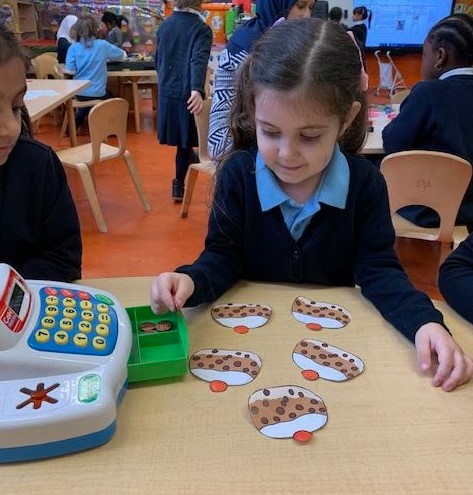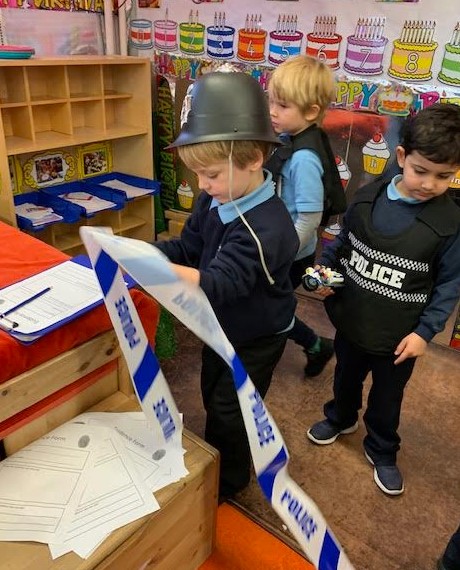Early Years
At Millfields our Early Years Foundation Stage (Nursery and Reception classes) provide an environment that is happy, warm, secure and stimulating. We always aim to ensure that all children become confident and independent, and enjoy exploring and learning. The practitioners equip the children with the skills to develop a strong sense of self, while also learning to play, negotiate and co-operate with others.


At Millfields your child will be learning skills, acquiring new knowledge and demonstrating their understanding through 7 areas of learning and development.
Children should mostly develop the 3 prime areas first. These are:
-
Communication and language;
-
Physical development; and
-
Personal, social and emotional development.
-
These prime areas are those most essential for your child’s healthy development and future learning.
As children grow, the prime areas will help them to develop skills in 4 specific areas. These are:
-
Literacy;
-
Mathematics;
-
Understanding the world; and
-
Expressive arts and design.
These 7 areas are used to plan your child’s learning and activities. The professionals teaching and supporting your child will make sure that the activities are suited to your child’s unique needs. This is a little bit like a curriculum in primary and secondary schools, but it's suitable for very young children, and it's designed to be really flexible so that staff can follow your child's unique needs and interests.
Communication & Language (C&L)
C&L is comprised of listening, attention, understanding and speaking and these skills are vital to children’s progress in all other areas of learning. At Millfields we have a strong focus on vocabulary acquisition and language development. We use high-quality core texts to plan and teach our literacy lessons. We have a ‘book of the week’ and we read to our children throughout the day. We engage with a wide range of texts, fiction, non-fiction and rhymes. We talk about texts, and develop children’s comprehension skills and ability to ask and answer questions about texts. We support children to use recently learnt vocabulary and to develop their C&L skills through role-play and planned adult interactions. Children identified as needing additional support to develop their C&L receive such support through small group interventions.
Personal, Social and Emotional Development (PSED)
PSED is comprised of self-regulation, managing self and building relationships. The development of strong, compassionate and supportive relationships with adults facilitates children’s understanding of their emotions and the emotions of others. At Millfields we support children to understand their own feelings and those of others and find ways to self-regulate if needed. We support children to develop PSED attributes throughout the day by being positive role models, identifying and discussing our emotions and resolving conflicts by discussion and understanding. We hold weekly circle times in each class, all children have the opportunity to talk, and have their voices and opinions heard in a respectful and supportive way.
Physical Development (PD)
This area is comprised of fine motor skills and gross motor skills. This area is crucial for children’s development allowing children to lead happy, healthy and active lives both in school and at home. Children at Millfields have access to a range of outdoor equipment, which supports the development of good coordination, core strength, balancing and being spatially aware. We follow the ‘Get Set 4 PE’ program for physical education. Children in the EYFS receive two hours of taught PE lessons per week, one being with our designated PE coach and one with the class teacher. Children learn fundamentals of PE, ball skills, dance, gymnastics and games where they develop their balance, strength and agility. In addition, they support the development of children’s gross motor skills. All EYFS classes have a ‘finger gym’ station which helps to develop fine motor skills and in turn supports with control and precision, the children’s ability to mark-make, write, and draw and to use a range of one-handed tools competently, safely and confidently.
Literacy
At Millfields we teach reading using RWI. We aim to foster a love of reading and storytelling by immersing our learning in high quality texts. We believe that reading is at the core of children’s learning and is a key indicator of children’s academic and social progress. We believe that by high quality teaching, using a structured systematic phonics scheme (such as RWI), every child can learn to read. In Nursery, we teach ‘letters and sounds’ prior to systematic phonics. In Reception, we teach children all the 31 Set 1 sounds and the 12 Set 2 sounds; we teach children to say the sound, write the grapheme, orally blend and decode words containing taught sounds using ‘Fred Fingers’ to segment words. We love books at Millfields and promote this enjoyment of reading throughout the day, as we know how important reading, comprehension, word reading and writing are to children’s academic and social development both in school and beyond. Our daily literacy lessons provide progression and challenge throughout the week. Children in Reception complete an adult-led writing task once a week. To further support children’s writing, we have engaging challenges and resources available on the writing table to encourage child-led exploration of writing and mark making in all of our EYFS classrooms.
Maths
This area is comprised of number and numerical patterns. At Millfields we follow the White Rose scheme of learning to deliver our Maths curriculum which underpins the mastery approach. The White Rose scheme of learning provides each year group with an overview, breaking learning into small steps objectives. In the EYFS, developing a strong grounding in number is essential so that all children develop the necessary building blocks to excel mathematically. Children learn to count confidently, develop a deep understanding of the numbers to 10, the relationships between them and the patterns within those numbers. We provide frequent and varied opportunities to build and apply this understanding, for example, using manipulatives -which include small counters and ten frames- for organising counting. Children develop a secure base of knowledge and vocabulary from which mastery of mathematics is built. Within our free-flow provision, we ensure children have continued exposure to numbers and number patterns through a wide range of activities. In addition, we ensure that the curriculum includes rich opportunities for children to develop their spatial reasoning skills across all areas of mathematics including shape, space and measures. It is important to us that children develop positive attitudes and interests in mathematics, look for patterns and relationships, spot connections, ‘have a go’, talk to adults and peers about what they notice and not be afraid to make mistakes.
Understanding the World (UW)
This area is comprised of past and present, people, culture and communities and the natural world. These objectives, which provide clear links to the Y1 curriculum, help children to make sense of the world around them as well as their communities. At Millfields, we weave opportunities to develop children’s understanding of the world into our half-termly topics. These activities provide opportunities for all children to become culturally, socially, technologically and ecologically aware. We value workshops and trips to provide enrichment opportunities and to create a sense of awe and wonder for the world in which we live.
Children in the EYFS learn by playing and exploring, being active, and through creative and critical thinking which takes place both indoors and outside. These “Characteristics of Effective Learning” underpin learning and development across all areas and will support your child to remain an effective and motivated learner.
Parents are an integral part of our department and we have clear and open communications with all of our parents and carers within the local and broader community. We work in partnership with parents and carers to meet the needs of the children and families, both individually and as a group.
Expressive Art and Design (EAD)
This area is comprised of creating with materials and being imaginative and expressive. At Millfields we know the importance of these areas on the development of children’s imagination and creativity and it is therefore important that children have regular opportunities to engage with the arts, enabling them to explore and play with access to a wide range of media and materials. In our Early Years classrooms EAD encompasses a wide breadth of creative areas, such as listening and responding to music, singing, dancing and performing, experimenting with colour mixing and different textures, creating models, for example, junk modelling, small world, construction and role play. Both Nursery and Reception classes take part in the annual ‘Creative Week’ at Millfields. This celebrates the wealth of creative talent of both pupils and staff as the whole school works together to produce a body of work around one central theme. At the end of the week, each year groups ideas culminate in a fantastic installation which is celebrated on Creative Evening. At Millfields EAD is used to support ‘cultural capital’ by arranging educational visits to museums and art galleries such as Tate Modern, V&A Museum and the Queens Galleries in Greenwich so that children can experience art, learn more about individual pieces and become inspired by art and artists.
EYFS Topics
Our topics and units of study help provide and scaffold the foundation to develop the children’s learning and engagement in an interesting way.
Useful Resources
Please click here for a copy of 45 key words for Reception children
Recommended books for starting school can be found here.




